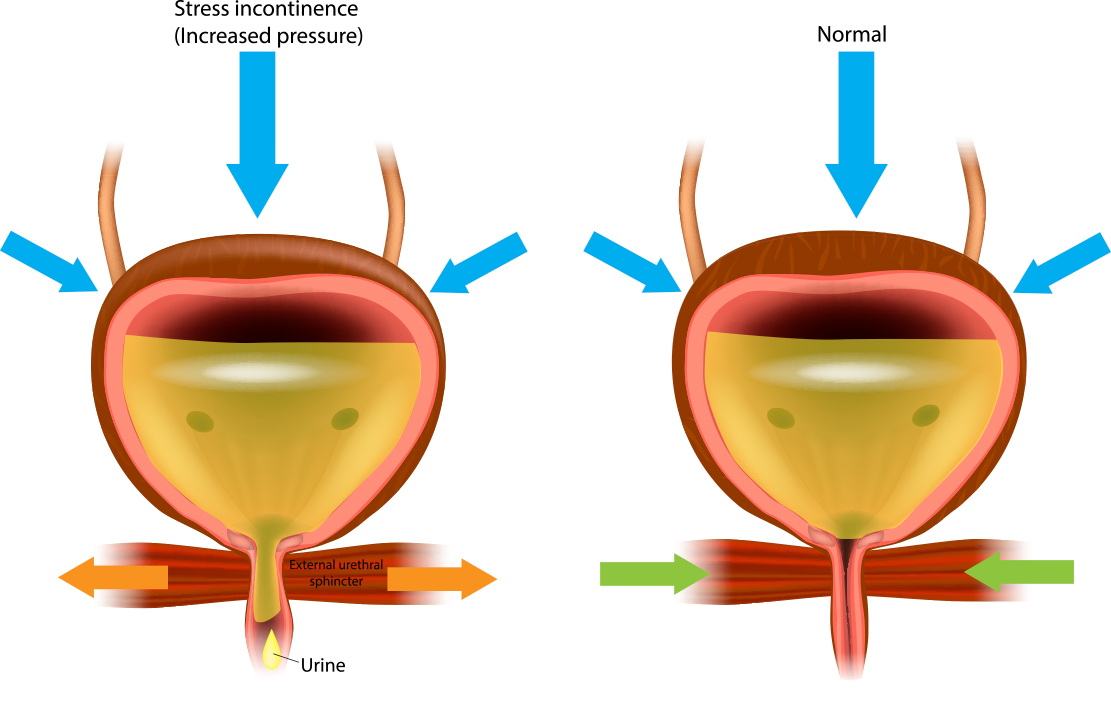Urinary Incontinence
Urinary Incontinence in Women
Pregnancy, childbirth, menopause and ageing – these natural milestones in a woman’s life can bring about many highs, but also some downsides.
In this case, these four milestones commonly cause <span class="font-semibold">some degree of urinary incontinence</span> in women. How so?
Pregnancy
As the uterus expands in size and weight during the course of the pregnancy, it presses down heavily on the woman’s bladder, which may cause involuntary urine leakage.
Childbirth
Childbirth – particularly vaginal births – place a lot of pressure on a woman’s pelvic floor muscles. This can cause the muscles to overstretch and weaken.
Menopause
Oestrogen is the hormone responsible for keeping a woman’s bladder and urethra healthy. As oestrogen levels drop, so too, will the pelvic floor muscles weaken.
Ageing
As we age, our muscles weaken and become less flexible – including the pelvic floor muscles. The bladder muscles can also become overactive as one ages.
If you are experiencing some loss of bladder control, seek medical attention by a urologist immediately, as it can be treated.
Contact Us
Am I Suffering from Urinary Incontinence?
You may be, if you experience symptoms such as:
- Leaking urine when the bladder is placed under sudden additional pressure (e.g. sneezing)
- Feeling a sudden and intense urge to urinate, with the inability to delay going to the toilet
- Inability to completely empty the bladder when urinating, no matter how hard one tries
Treatment for Urinary Incontinence
Many women live with some degree of urinary incontinence, thinking that it is common or something that cannot be helped. This is not true! There are many treatments available:
At-Home Treatment
- Dietary Changes: Refrain from drinking beverages that irritate the bladder, such as coffee and alcohol.
- Bladder Training: Stick to a fixed urination schedule and gradually increase the duration between each toilet break.
- Kegel Exercises: Strengthen the pelvic floor muscles by repeatedly contracting the muscles.
- Weight Loss: Maintaining a healthy, as being overweight places pressure on the pelvic muscles.
Medical Treatment
Your urologist may prescribe one or more of the following:
- Medications that calm an overactive bladder by blocking the action of a neurotransmitter in the brain
- Medications that relax the bladder muscle, thereby increasing the amount of urine that can be stored
- Hormone therapy in the form of topical oestrogen for menopausal women, as oestrogen helps maintain urinary tract function
Minimally Invasive Therapies
- Botox injections into the bladder to help the bladder muscles relax
- Electrical nerve stimulation to alter nerve activity to improve bladder control
- Vaginal laser therapy can relieve symptoms of an overactive bladder
- Bulking agents (such as collagen) may be injected around the urethra to increase the thickness of the urethral wall, thereby reinforcing its strength
Surgical Treatment
- Sling Procedures: The patient’s own tissues are used to create a pelvic sling placed under the urethra and bladder neck, keeping the urethra closed during a sudden pressure (e.g. cough). A tension-free tape (TVT) may also be placed under the urethra, providing support to a sagging urethra.
- Suspension Procedures: Also known as a bladder neck suspension, this procedure reinforces the urethra and bladder neck so that they will not sag. It also provides a barrier for the urethra to press against to help prevent urine leakage.
To determine the most suitable and effective treatment for you, seek the advice of an accredited urologist specialising in female urology today.
Contact UsDr Michael Wong
Medical Director & Senior Consultant Urologist
FAMS (Urology),FICS (USA),FRCS (Edinburgh),M Med (Surgery),MBBS (Singapore)
Award 2018
by:

Our clinic provides specialised and dedicated care for women experiencing urological problems, helping them regain confidence and comfort in their lives.
For further enquiries, please contact our specialist clinic today
Mount Elizabeth Medical Centre, Singapore 228510

